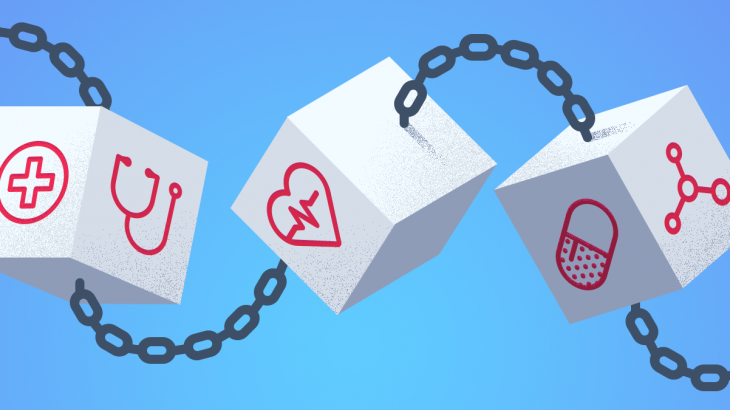Blockchain in Healthcare
As time and technology progress, the demand of businesses to make use of digital transformation also grows. Even in health care industry, the urgency of digital transformation is escalating to higher levels.
Even though gadgets like smart phones, computers etc. are there, we are still unable to collect, analyze, secure and exchange data seamlessly. Presently, the processes in health care are tedious and lengthy as critical patient data and information remain scattered across different departments and systems. The misuse of available data often prevents healthcare organizations from delivering appropriate patient care and high-quality service.
A research study notes that half of the clinics/ hospitals go unreported, 40% of data records are filled up with human errors and 30% loss in turnover are due to healthcare data breaches. This is because many healthcare facilities today are still dependent on outdated systems for keeping patient records. These systems slow down the functionality and make it difficult for both doctors and patients. Even though, in drug counterfeiting, there shows a loss of around 200 million dollars in turnover due to inaccurate tracking system feature.
Another issue striking healthcare industry is exchange of health data. Due to huge volume of data there occurs a chance for identity thefts, financial data crimes and spamming. Therefore, the healthcare system today not only needs an advance system but also requires a solution that is smooth, transparent, secure, economically efficient and convenient.
These situations make call for the adoption of blockchain solution. It is a technology that creates permanent and distributable data records which are shared between organized database frameworks. It helps to constantly store digital data in a way that it does not share until it recognize the beneficiary. It keeps track of transactions and activities happening throughout the network. The most important advantage of blockchain is that it is absolutely secure as a whole. Because once a piece of data is added to the distributed ledger, then there is no way to change it. If a modification or change is required it is mandatory to make changes to the entire slab.
Block chain offers higher security and transparency in creation and sharing of database of health information. Because blockchain creates secure digital identity, a private key cryptography for every transaction on the open network is created. Blockchain also allows multiple entities of the healthcare data to stay in sync and shares data on a commonly distributed ledger. This helps the user to share and keep a track of their data and other activities happening in the system without having to look out for additional options for integrity and security. Any change made in the ledgers is reflected within seconds. Another appealing benefit of blockchain in healthcare is the use of cryptocurrencies as payments in place of cash. Bill processing automation feature will remove the third parties from the chain and ensure that no frauds are made during the process.
Blockchain in counterfeiting of drugs is another major advantage for healthcare for the adoption of this technology. Blockchain technology in drug tracking emphasizes more on security. Every new transaction about drug which is added to a slab will be a constant, which makes it easy to track a product and ensure that the information inside the slab cannot be altered. Also blockchain seeks for authenticity to avoid fraud entries.
Blockchain is also adopted in order to make the clinical trials more fair and transparent. Researchers can make use of blockchain technology which could help to record secure, unbiased and transparent clinical trials.
Adoption of blockchain for healthcare highly depends on the acceptance of the new technology and facilities. Over the past year, it has taken the healthcare sector by storm.



